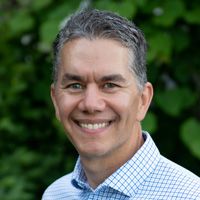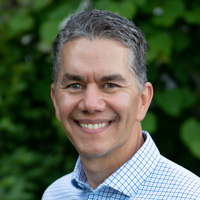Finances Aside, What Does a Happy Retirement Look Like?
Three examples of retirees show what it means to thrive in retirement. The common denominators provide clues on how to swing your own happy retirement.


Profit and prosper with the best of Kiplinger's advice on investing, taxes, retirement, personal finance and much more. Delivered daily. Enter your email in the box and click Sign Me Up.
You are now subscribed
Your newsletter sign-up was successful
Want to add more newsletters?

Delivered daily
Kiplinger Today
Profit and prosper with the best of Kiplinger's advice on investing, taxes, retirement, personal finance and much more delivered daily. Smart money moves start here.

Sent five days a week
Kiplinger A Step Ahead
Get practical help to make better financial decisions in your everyday life, from spending to savings on top deals.

Delivered daily
Kiplinger Closing Bell
Get today's biggest financial and investing headlines delivered to your inbox every day the U.S. stock market is open.

Sent twice a week
Kiplinger Adviser Intel
Financial pros across the country share best practices and fresh tactics to preserve and grow your wealth.

Delivered weekly
Kiplinger Tax Tips
Trim your federal and state tax bills with practical tax-planning and tax-cutting strategies.

Sent twice a week
Kiplinger Retirement Tips
Your twice-a-week guide to planning and enjoying a financially secure and richly rewarding retirement

Sent bimonthly.
Kiplinger Adviser Angle
Insights for advisers, wealth managers and other financial professionals.

Sent twice a week
Kiplinger Investing Weekly
Your twice-a-week roundup of promising stocks, funds, companies and industries you should consider, ones you should avoid, and why.

Sent weekly for six weeks
Kiplinger Invest for Retirement
Your step-by-step six-part series on how to invest for retirement, from devising a successful strategy to exactly which investments to choose.
In the late 1990s, my business partner and I were at a conference where Jim Boeheim, the Hall of Fame member, and past head coach of the Syracuse men’s basketball team, spoke. Boeheim’s message was that students would tell him all the time how talented they were, and Coach’s response would be, “Show me — don’t tell me.” In essence, Boeheim would give the student athletes time, and it was up to those players to show Coach their ability to perform on the court under pressure.
Recently, a client came into the office who was overly anxious about retiring and asked me for specific examples of people who had a happy retirement. I had a déjà vu moment of listening to Coach’s words at the conference and decided this would be a wonderful way of transitioning the conversation with the client. Anxiousness is not at all uncommon to those people who have the financial capability of retirement, but are unsure as to what the ideal day in retirement may look like. There is no finality in retirement, and retirement can take on many meanings whereby in some instances you do not have to stop working.
For most financial advisers, the fundamental questions that are most often asked are:
From just $107.88 $24.99 for Kiplinger Personal Finance
Become a smarter, better informed investor. Subscribe from just $107.88 $24.99, plus get up to 4 Special Issues

Sign up for Kiplinger’s Free Newsletters
Profit and prosper with the best of expert advice on investing, taxes, retirement, personal finance and more - straight to your e-mail.
Profit and prosper with the best of expert advice - straight to your e-mail.
- Am I going to be financially OK during my retirement?
- Can I maintain my lifestyle?
- Do you see any blind spots that I am not prepared for?
To provide confidence, it is critical to review several factors quantitatively and qualitatively, such as age, lifestyle, expenses and financial goals. Each household would then need to evaluate their current situation and modify accordingly.
- What will be your spending plan in retirement?
- What retirement income, savings and investments will be used?
- Forecast and/or project the number of years you plan to be retired.
Albeit there are endless calculations, theories and models one can reference for clarity with traditional financial planning, the purpose of this article is to share examples of those people who are thriving in retirement. The following three examples are of people who are living their best lives in retirement:
Example #1: The Golfer
At age 81, Roger successfully records 98-plus rounds a year of golf, which is his passion. Most impressively, Roger’s skills allow him to shoot most of his 18-hole rounds under his age, breaking 80 consistently. To provide perspective, about only 2% to 5% of golfers can consistently break 80 during an 18-hole round.
Roger, an early-age athlete, decided that retirement was not going to slow him down. Golf/sports were going to be the center of his daily routine. During retirement, Roger has competed at the senior level, super senior level and has found a way to keep his competitive passion for golf’s fire burning.
Upon determining an official retirement date, Roger stated that it was important for him to join a golf club, as a club would open doors to his newfound time in his calendar for meeting people, joining golf leagues and participating in as many events as possible at his club.
The golf club needed to attract likeminded people, and it was critical that he test out several prior to making this commitment. After successfully finding a club, Roger has since built relationships with many new people that are among his closest friends today. These people have opened doors of travel for him and his wife, and many of the spouses have become close friends, spending time both on and off the golf course together. It is a breath of fresh air to see Roger and listen to his newest golf stories.
Example #2: The Widower
Michael’s wife, Monica, passed at the age of 59 after a courageous battle with cancer. Monica was, by all accounts, the glue that kept the family together. There was not a day that went by during Monica’s struggles and challenges that she didn’t take time to check on friends, family and anyone who she felt needed help. Her stoicism was unlike that of anyone I have met. After multiple surgeries, doctor’s appointments, and hospital visits hundreds of miles from home, Monica somehow found time to plan family vacations for her extended-family members, coordinate wedding plans for nieces and nephews and care for her parents during her last days.
Michael had a very hard time as to what to do with his retirement as an entrepreneur, having taken an early retirement to care for his wife. Leading up to Monica’s passing, their joint schedule was so tight, they didn’t have time to get lost in the reality of retirement. When Monica passed, Michael was overwhelmed with calls, letters, e-mails, visits and stories of Monica always taking time to make a difference in their lives. Michael received over 300 cards, many from people he didn’t even know, as a testament to Monica’s selfless giving.
As difficult of a situation as it is, and was, Michael embraced the situation and pivoted. I found great inspiration from our meeting after Monica passed. Michael said that he was going to avoid “bad habits,” namely distancing himself from some people. He was going to get out of his comfort zone and not stay in the house. Michael shared that he had joined a local gym and committed to exercise initially three times per week. Michael always wanted to learn about pottery and matriculated in a local art college, participating in evening pottery classes. Surprisingly, he met people at art school who inspired him to start a watercolor class.
Michael and his son have spent much more time together in their mutual love of music and plan to attend several indoor and outdoor concerts this year. Michael has developed a new network of friends, found a new energy from the gym and enjoys much time with family. Michael does not have time or interest in developing bad habits.
Example #3: The Principal and the Superintendent
It would be very rare that Rachael and Kimberly would arrive home before 7 p.m. in the evening when most of us have eaten our dinner, cleaned the dishes and put on our comfy clothes. Being in the spotlight of public education, their lives revolved around the children, and in their roles, they had to maintain a presence at the school campus. It is not uncommon for many administrators to work eight to 12 hours per day, and after the school day ends, many are still on the clock.
Planning for their retirement was intentional and well thought out. In preparing for retirement, it was decided that the need for an RV would be essential. Living in New York and having family in Arizona, traveling back and forth would be adventurous in an RV and would give them time to see and learn about the country. As they were unsure about a second-home location, the RV would allow them the freedom and independence to venture into any area of interest on their terms.
Once the retirement date was set, the Minnie Winnie Winnebago was fueled, serviced and ready for deployment. First stop: Florida. What better place to start their retirement than at Walt Disney World? Both Kimberly and Rachael have shared stories of their campground adventures, states visited, and people met with engagement and excitement.
The road trips have allowed them to get clarity on purchasing a second home in Florida, where they have an amazing network of friends, social activities and so many new restaurants to test their “foodie” interests.
Recently, these ladies shared with me that they never imagined they would have so much fun, meet so many interesting people and be so busy in retirement. In hindsight, knowing what they know now, they would have retired years earlier!
In summary, the unknown is scary for many and for others a true adventure. These are only three of the many examples of people who have embraced retirement and have a newfound energy and excitement for their golden years.
The common denominators of the examples above can “show you” how to live your best retirement:
- Maintain your health. Taking care of yourself physically and mentally is crucial for maintaining your edge and enjoying retirement. Get regular exercise, focus on proper nutrition and prioritize your mental health and well-being. Being around people, especially likeminded people, will create excitement and fulfillment.
- Set new goals. Stretching your comfort zone, as scary as it may feel initially, leads to some of the most rewarding feelings. Consider setting goals related to travel, learning new skills or making a positive impact on your community.
- Stay engaged. Retirement doesn’t mean you will be left out in the pasture, disengaged from the world. Maintain your special interests. Consider volunteering or start a new venture to stay engaged and maintain your sense of purpose.
- Enjoy and celebrate. Take time to enjoy your financial capabilities. Treating yourself to a special experience and sharing your success with loved ones can lead to joy and curating special memories.
There is no substitute for a solid retirement plan, as having financial capabilities allow many opportunities in retirement. Live every day in gratitude, celebrate your achievements and be intentional with your time and priorities. What an exciting time to retire!
Content in this material is for general information only and is not intended to provide specific advice or recommendations for any individual.
Profit and prosper with the best of Kiplinger's advice on investing, taxes, retirement, personal finance and much more. Delivered daily. Enter your email in the box and click Sign Me Up.

Dennis D. Coughlin, CFP, AIF, co-founded CG Capital with Christopher C. Giambrone in 1999. He has been in practice since 1996 and works with individuals nearing retirement and those whom have already retired. Proud of his humble upbringing, Dennis shares his advice with the same core principles that he was raised with. When not in the office, you will find him with his family enjoying the outdoors.
-
 5 Vince Lombardi Quotes Retirees Should Live By
5 Vince Lombardi Quotes Retirees Should Live ByThe iconic football coach's philosophy can help retirees win at the game of life.
-
 The $200,000 Olympic 'Pension' is a Retirement Game-Changer for Team USA
The $200,000 Olympic 'Pension' is a Retirement Game-Changer for Team USAThe donation by financier Ross Stevens is meant to be a "retirement program" for Team USA Olympic and Paralympic athletes.
-
 10 Cheapest Places to Live in Colorado
10 Cheapest Places to Live in ColoradoProperty Tax Looking for a cozy cabin near the slopes? These Colorado counties combine reasonable house prices with the state's lowest property tax bills.
-
 Don't Bury Your Kids in Taxes: How to Position Your Investments to Help Create More Wealth for Them
Don't Bury Your Kids in Taxes: How to Position Your Investments to Help Create More Wealth for ThemTo minimize your heirs' tax burden, focus on aligning your investment account types and assets with your estate plan, and pay attention to the impact of RMDs.
-
 Are You 'Too Old' to Benefit From an Annuity?
Are You 'Too Old' to Benefit From an Annuity?Probably not, even if you're in your 70s or 80s, but it depends on your circumstances and the kind of annuity you're considering.
-
 In Your 50s and Seeing Retirement in the Distance? What You Do Now Can Make a Significant Impact
In Your 50s and Seeing Retirement in the Distance? What You Do Now Can Make a Significant ImpactThis is the perfect time to assess whether your retirement planning is on track and determine what steps you need to take if it's not.
-
 Your Retirement Isn't Set in Stone, But It Can Be a Work of Art
Your Retirement Isn't Set in Stone, But It Can Be a Work of ArtSetting and forgetting your retirement plan will make it hard to cope with life's challenges. Instead, consider redrawing and refining your plan as you go.
-
 The Bear Market Protocol: 3 Strategies to Consider in a Down Market
The Bear Market Protocol: 3 Strategies to Consider in a Down MarketThe Bear Market Protocol: 3 Strategies for a Down Market From buying the dip to strategic Roth conversions, there are several ways to use a bear market to your advantage — once you get over the fear factor.
-
 For the 2% Club, the Guardrails Approach and the 4% Rule Do Not Work: Here's What Works Instead
For the 2% Club, the Guardrails Approach and the 4% Rule Do Not Work: Here's What Works InsteadFor retirees with a pension, traditional withdrawal rules could be too restrictive. You need a tailored income plan that is much more flexible and realistic.
-
 Retiring Next Year? Now Is the Time to Start Designing What Your Retirement Will Look Like
Retiring Next Year? Now Is the Time to Start Designing What Your Retirement Will Look LikeThis is when you should be shifting your focus from growing your portfolio to designing an income and tax strategy that aligns your resources with your purpose.
-
 I'm a Financial Planner: This Layered Approach for Your Retirement Money Can Help Lower Your Stress
I'm a Financial Planner: This Layered Approach for Your Retirement Money Can Help Lower Your StressTo be confident about retirement, consider building a safety net by dividing assets into distinct layers and establishing a regular review process. Here's how.